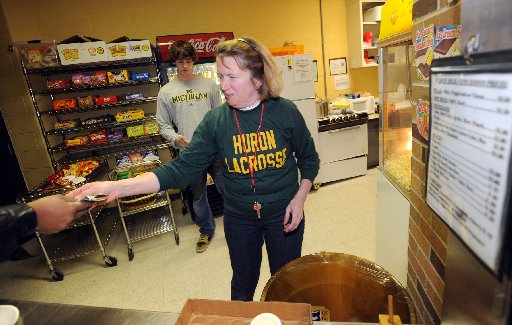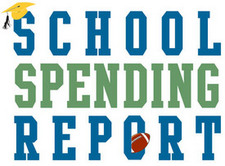High school booster clubs responsible for fundraising, careful spending

Huron High School parent Leigh Helvie works the concession stand last week. Concession sales are just one way booster clubs raise money. Photo: Lon Horwedel | AnnArbor.com
Claire Hogikyan often feels more like a small business owner than her title of Huron High School booster club president may suggest.
There are books to balance, shareholders to answer to and spending requests to manage. As the top administrator of a nonprofit organization charged with overseeing the support arm of the Huron athletic program, there is no shortage of responsibility.
In a given year, $400,000 to $500,000 runs through Huron's booster club account. Monies come in through used book sales and other fund-raisers. In return, each of the 30 varsity programs at Huron benefit.
And if there's any question as to how smoothly things are running, Hogikyan gauges satisfaction by the feedback she receives.
"You know the saying, 'No news is good news'? I'm going to say that they must feel OK about it because I know for sure, I would hear about it," Hogikyan said. "People have my e-mail address, my phone number; they would definitely let me know about it if something is bothering them."
Booster clubs may be more important than ever for high school teams in the Ann Arbor school district. High school athletics cost the district $2.5 million in the 2009-10 school year. With the district facing a $20 million budget deficit for 2010-11, Superintendent Todd Roberts has proposed a pay-to-play plan that would charge high school athletes $150 a year to play sports.
How booster clubs manage funds differs among the schools. Boosters at Huron and Skyline operate one account that encompasses the entire athletic program. Team representatives keep each sport's priorities in front of the general board. At Pioneer High School, each sport handles its own account within the club.
While some of Pioneer's 35 programs - like football and baseball - have chosen to shed their individuality and become part of the school's general booster club, many sports - such as rowing - are on their own, dictating how funds are used without having to be part of the larger body.
Pioneer athletic director Lorin Cartwright said she'd rather see Pioneer follow Huron's lead as individual clubs can lead to competition for fundraising and advertising dollars from local businesses.
"It's like trying to go in and sell the same candy bar on the same day to the same people," Cartwright said. "Rather than having 35 clubs moving in 35 directions, I would rather see us all moving in the same darn direction and working toward the same goals.”
Monthly financial reports keep each booster club's spending transparent. Hogikyan said Huron's club rarely flat-out rejects a request for funds from a team, but may require more proof that a need exists.
“There has to be some accountability," Hogikyan said. "We need people to know we're not a bunch of freebies and you can just come in with your hand out and say, 'I need some money, please.'"
Skyline athletic supervisor John Young agrees. Before taking the job at Skyline in August, Young worked as the executive director of the Greater Lansing Sports Commission, a nonprofit organization that oversees community athletics.
With parents being asked to contribute more, Young said they demand to know what's happening with the money.
"Every sport has a voice, and money is hard to wrench out of their pockets," Young said. "And with the way the economy is, people want absolute justification for what's being spent."
|
Booster Reports Click the links below to view the PDFs Pioneer Lacrosse |
The district's athletic administrators work with booster clubs, which also have a board of directors providing oversight.
"I don't have veto power, but I have a voice," Cartwright said. "I don't even get a vote, but if someone comes up and says, we want heaters up in the bleachers and I say no, you'd be hard-pressed to continue try and work with an athletic director when you're spending money in a way that's really not appropriate.”
The Pioneer Rowing Club has the largest budget of any of the booster groups at Pioneer with an annual budget of about $100,000 to run boys and girls teams. And the rowing club depends on heavy parental involvement and support.
Rowing coach Rich Griffith makes sure the club is making the most of its money. New boats carry a price tag of $30,000 and remain in racing condition for five to eight years. The club often sells its older boats or considers purchasing used boats.
According to tax forms filed by the group, the club in 2006 generated revenues of nearly $156,000. Although his team has turned out some top-notch rowers, Griffith attributes much of his team's success to the support team that raises between $14,000 and $15,000 every year.
"I think crew is a sport that takes over your life and so when you support it, it becomes kind of like a social family that people want to be around," he said. "So I think when it's like that, people want to participate."
Even if booster clubs need to be more creative as budgets shrink, Huron’s Hogikyan says it’s worth every volunteer’s time. "I think it's a great thing to have really high-quality sports available to kids," Hogikyan said. "This isn't just a fun, 'I don't know what else to do with my time' thing. Or maybe they don't know what else to do with their time.
"We'd love to have those kids out exercising and being a part of this organization that's well-run and where we know what you're doing."
Jeff Arnold covers sports for AnnArbor.com. He can be reached at jeffarnold@annarbor.com or 734-623-2554. Follow him on Twitter @jeffreyparnold.


